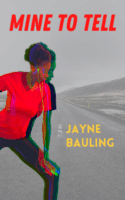I try to take deep, slow breaths as I climb into the bus that will take the Phalaborwa athletes to Polokwane. My heartbeat is so fast that I feel sick and faint.
Most of the other athletes are already on the bus; there’s just Fumani behind me, with Oom Leon behind him.
There’s a gasp, a stir, and then Dzanga calls out, “You’ve got a nerve, Ritlatla, inflicting yourself on us.”
“Watch it, Dzanga,” Fumani growls.
His presence gives me strength, but I say, “It’s okay, I’ve got this.”
Because I have to do this myself. He can’t do it for me.
I stop, stand at the front of the bus, looking at the people in the seats. A sea of faces, all looking back at me, some expectant, others worried or upset. I see Pahlazi hissing something angry at Dzanga across the aisle. I see Judith smiling at me, welcoming me. I see Mahlatse looking shocked and embarrassed.
“I have something to tell you all.” My voice comes out rough, so I swallow and try to steady myself. “I’ve been on meds all my life. To answer your questions about what I did to get HIV. I was born with it, that’s all, big crime. But even if I’d got it from having sex, as some of you obviously thought, that wouldn’t make me what you called me. Anyway, I got it from my mother. She died when I was still a baby.”
“So sorry, Ritlatla,” someone says.
“I know some of you are genuinely scared,” I carry on. “I understand that, as Aids is sometimes known as Stage 3 HIV, so it’s important for me to tell you that it’s safe for you to be around me. I shouldn’t have to tell you. My status – it’s mine to tell, to the people who need to know, no-one else. I made a mistake and told someone who first, overreacted, and second, didn’t respect my privacy.”
“How do we know it’s safe?” Xongisa calls out, sounding uncertain.
“Because Ritlatla says so.” Pahlazi looks straight at me. “It’s okay, we trust you, Ritlatla.”
“Thanks.” I send her a shaky smile. “Then I’ll just add that my ARVs are doing a good job, as my viral load is undetectable at present. Plus, I try to live a healthy life, and that helps. Exercise, hygiene, good diet, that sort of thing. Boring really … uhm, that’s about it, I think.”
“Thank you for explaining to us,” Pahlazi says. “Some of us already knew these things, but clearly others needed to hear them.”
“If anyone has questions?” I offer, hoping no-one does.
“As long as they’re not totally idiotic questions,” Fumani warns from behind me, lowering his voice to add, “Well done, girl.”
“Right, that’s that,” Oom Leon says. “Now find yourself seats, and let’s hit the road.”
As we move down the bus to where Ndjombo is signalling that there are seats available, I see that some people, like Dzanga, Mahlatse, and Xongisa, are looking awkward. Most of the rest nod at me as I pass, or are talking among themselves. They’re not even talking about me, and what I’ve said, from what I overhear; like it was no big deal.
That’s as it should be. Relief makes me smile at Fumani as we sit down near Ndjombo. We’re wearing our masks, but I can see from his eyes that he’s smiling back at me.
“This is gonna be an awesome weekend,” he predicts.
And it is, from sitting next to him, holding hands, during the drive to Polokwane, to the athletics meeting at a big stadium.
Even if the stands are empty due to Covid-19 regulations, there’s plenty of noise from the other athletes – and especially from the Phalaborwa team when I win the women’s 800 metres.
Tell us: There is much less prejudice and ignorance about HIV than there used to be, but it does still exist. What is needed to overcome this?


